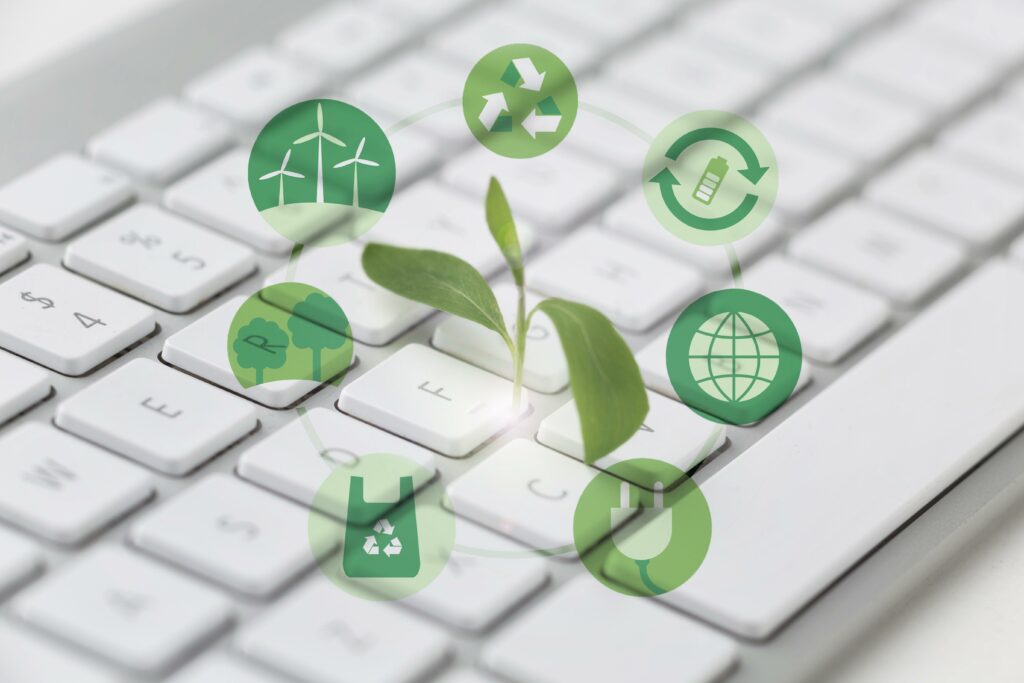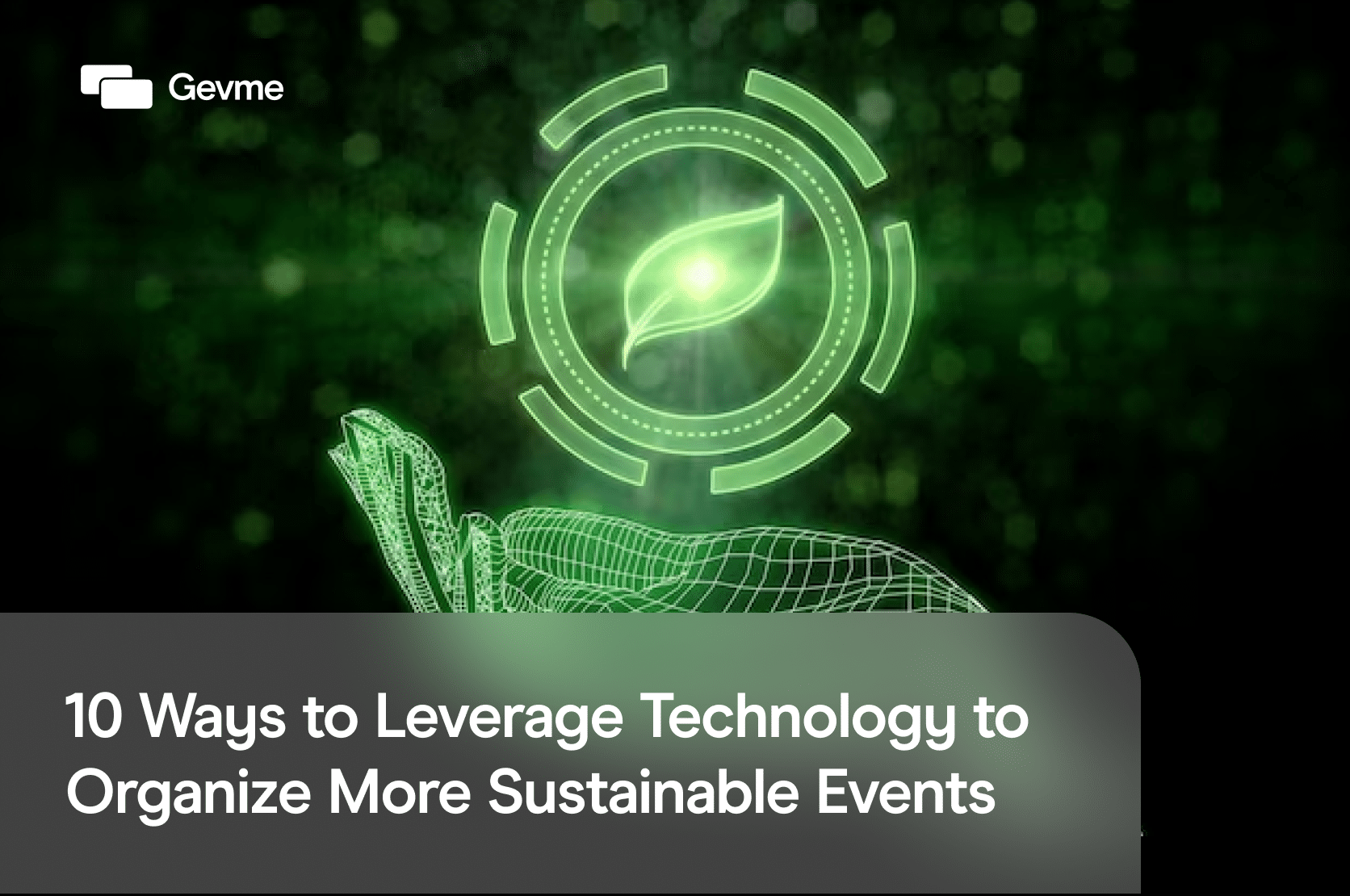Over recent years, there has been an overwhelming focus on climate protection, and environmental, social, and corporate governance (ESG). The event industry has been forced to reconsider its practices and its approach to become more sustainable and switch to sustainable event management. The planning of a sustainable event includes various factors such as the choice of venue, reduction of waste, proper waste management, optimum utilization of resources, less use of transportation, and more.
The threat of climate change has pushed event companies to embrace sustainable solutions to plan their events by leveraging digital technologies toward a better and greener future, highlighting the potential of data for sustainable development. Bringing digital technologies and sustainability together makes logical sense. In this feature, we list some sustainable management ideas that you can take up to reduce your carbon footprint while planning your next event.

- Web-based event registration software
Let go of the labour-intensive, paper-based event registration. Sustainable event management is the need of the hour. Web-based event registration software enables online registration and confirmation through email round the clock along with self-registration on-site by using the event-branded kiosks so as to add marketing value. These tech solutions are equipped with robust event reporting tools in addition to real-time reports so that the event planners stay informed regarding the metrics such as attendee counts through geographic location, badge types, and registration done beforehand versus onsite registration. All the data collected by these kiosks can be used to plan future events.
- Event beacon technology
Beacons are small objects that can be conveniently placed around venues. These beacons emit low-energy Bluetooth signals which create an interactive network for event app users. The event beacon technology can provide seamless on-site registration and seamless check-in, add to attendee engagement, provide better marketing opportunities, booth and aisle traffic data feed and enhance sponsorships facilitated by the real-time alerts backed by the intuitive web-based dashboard. Beacons are an advanced technology that aims at supporting sustainability goals while serving as a logistical and effective support and marketing tool.
- Digital document libraries
Going paperless is one of the best ways to reduce carbon footprint and a sustainable event management practice. Digital document libraries are one of the best alternatives for the same. A paperless depository for event management companies to place all the necessary information, the digital document libraries let the organizations generate leads and collect data about what information is being accessed, by whom, and when.
Additionally, these libraries can be easily accessed by key constituents, meeting attendees, and customers. The data gathered by the document libraries can be easily exported, analyzed, and passed on to the sales team for effective business development measures.
- Mobile apps
Having a mobile app is a brilliant way to incorporate technology in event planning and reduce carbon footprint while staying in touch with your attendees throughout the event lifecycle. Mobile apps can be used to eliminate paper-based documents while offering the attendees the comfort of accessing conference agendas, speaker bios, different videos, event information, other news, etc., as well as the ability to communicate with other event participants and engage with them via social media integration.
Event organizers can save a lot of money and time by uploading maps and directories on mobile apps. Toward the end of the event, mobile apps can prove to be an effective way to get quick feedback from event guests about their experience to understand attendee behaviour and the scope for improvement.
- e-Literature Libraries
e-Literature libraries can be put to use by event management companies, event sponsors, brand associates, and exhibitors to deliver all sorts of product information, event information, and core brand messaging. e-Literature libraries add to the ease of on-demand content distribution among the attendees who can download it to their USB drives for viewing it in the future and/or sharing it with others after the event. Having an e-literature for guests is a terrific method to build an event’s outreach while having a sustainable event management measure in place. The event management has complete control over which files and folders are accessed by whom. This ensures minimum to no use of paper while incorporating technology in event planning.
- Interactive kiosks
Interactive kiosks are a great step towards sustainable event management. An environmentally friendly technology that can be used by event management to keep the attendees informed with up-to-date information on different aspects of an event, the event venue, event location, the city — cultural spots to visit, convenient means of transportation, news updates about weather and any other information that may be required.
Interactive kiosks are a sustainable event management step for sponsors and exhibitors for high brand visibility, generating more traffic for billboards to communicate news about their organization and miscellaneous marketing messages. Placing charging kiosks perform double duty by providing the event attendees with a convenient way onsite to charge their mobile devices and stay connected on the move.

- Digital signage
The technology used at events has reached a new level of sophistication. Delivering paperless messaging with a built-in wow factor, the rise of digital signage has changed the way event marketing is looked upon while acting as a means to share messages and increase overall audience engagement.
In addition to breaking the usual monotony of advertising, the impersonal nature of digital signage at events provides a wonderful opportunity for the event planners, sponsors, and exhibitors to display branded content in varied formats ranging from audio-visual content, and text to static images, live updates to electronic banners, news, and social media feeds, for maximum impact and engagement. The event planners have been using this cutting-edge innovation quickly to enhance their events and reach.
- Data analytics tools
We are living in a digital age where data is everywhere. Over the recent years, companies have realized the power of data, and how data brought more awareness among the consumers for making better choices while helping brands improve their services. Similarly, the event industry is no different. An efficient data analytics software can help companies use the collected data at events to the best of their potential. Analysis of data can help in pulling a sustainable event management plan together.
Data collected from previous events can provide a framework upon which event planners can strategically improve. The real-time event data (e.g. from event apps) can help event organizers manage sustainability aspects as the event unfolds in a better way. Event apps, sensors, and tools used to measure the usage of resources and reduce carbon footprint are all great ways to generate and collect useful data to plan more eco-friendly events in the long run.
- Augmented Reality and Virtual Reality (AR and VR)
Some of the most exciting technology developments, augmented reality and virtual reality can be used in a wide range of cases in the event industry. Promoting sustainability in different ways, AR and VR have made hybrid meetings a preferred alternative to physical presence while also enhancing virtual attendance capabilities better than ever before. Together, AR and VR can promote sustainable event management in different ways. For instance, the attendees can visualize different product features through VR, instead of having to use more event space, use energy and transport, etc. to see the product for real. In addition to this, augmented reality can also be used to improve the overall user experience.
While virtual reality technology is evolving at a fast pace, the world is yet to experience its full potential and it can bring forward in the sustainable event management space. So far, it has been used to demonstrate big and small products to people at the convenience of their homes, improve presentation and pitches, event venue navigation, enable the guests to attend the event through remote attendance options, etc. Hybrid and remote attendance options are not only more convenient, but they also significantly reduce the carbon footprint of attendees by reducing transport, waste, energy use, etc.
- More creative ways
Each of the points mentioned above makes use of technology in event planning to help reduce carbon footprint, there are also many other ways to get creative with technology to promote sustainable event management such as:
- pedal powering can be used for various activities including pedal power blending so that people can generate electricity to charge their phones.
- converting footsteps into energy by providing energy-generating pedestrian walkways.
- arranging transport that makes use of electric energy instead of non-renewable sources of energy.
Benefits of sustainable event management
Prioritizing sustainable event management has numerous benefits. Demonstrating a commitment to eco-friendly initiatives by the event organizers appeals to the attendees who are on the lookout for sustainable events which can lead to higher event attendance rates and positive brand recognition. Apart from this, integrating a sustainable event management plan can result in financial gains, conservation of resources, and waste reduction measures which quite often leads to cost savings. Let us look at each of these advantages in detail.
- Digital Orientation and Environmental Performance
Researchers have found that companies that have a strong strategic focus on utilizing technology tend to have a higher ability to adapt to the change in market situations. Moreover, such companies can identify and exploit opportunities for innovation which in turn makes them more efficient in terms of their utilization of resources, which results in lowering the total cost, enhanced attendee experience, and a reduced impact on the environment. All of this makes more sense in the case of event marketing companies which are always looking for ways to leverage technology in event planning for sustainable event management.
- Financial advantages
Reducing waste, consuming less, conserving energy, and purchasing local products can help in saving money. Even though investing more resources (monetary and human) to research new systems to invest in new tools and applying sustainability practices can help in saving money on an immediate basis — for instance printing less marketing material and ultimately having less waste to collect. Promotional tools like these can be conveniently replaced by QR codes which will help in saving resources while achieving a similar effect. Ideas like these can also have long-term financial gains due to the more efficient use of resources and easy access to sponsors and credit lines.
For instance, if you use technology to host your event online, not only will it help in reducing carbon emissions but it will also reduce the need for participants to travel to event venues. In a way, this will help in saving costs as you will not have to spend much on the venue rental.
- Positive effect on society
Apart from direct benefits for the organizers, shifting towards digital sustainable practices is also known to have positive effects on society as a whole. When event management companies become efficient and sustainable in a bid to reduce their carbon footprint, they can also develop sustainable plans and products that shall encourage the customers to take small steps to reduce their environmental impact. Additionally, prioritizing digital sustainability enables event management companies to make a positive change in the wider ecosystems, reducing the environmental impact of the event and doing their bit for a sustainable future.
- Positive reputation and improved image
Promoting the fact that you are hosting or organizing a sustainable event is bound to raise the profile of your event – attracting participants who are constantly becoming aware of the climatic issues, environmental threats, and the need to implement sustainable practices daily. It may also gain media attention and gain appreciation from potential donors and partners as well as the general public.
- Raising awareness and inspiring change
As event organizers, your event is an excellent opportunity to raise awareness among your colleagues, staff, service providers, the local community, the general public, the wider events community, and the attendees, of course about the urgent need to take sustainable steps and sustainable events. Event organizers can lead by example and motivate all the people involved in the event and send a message to other event management companies to take responsible decisions and introduce environmental and social improvements into their events and organizations.

In the present times, there has been a shift in the market. The world is moving towards sustainability and sustainable event management practices are more accessible now than ever before. We have talked about different ways to leverage technology in event planning, ideas to reduce carbon footprint and take a step towards sustainable event management. Once people experience climatically beneficial alternatives, they do not want to go back to their uninformed practices. Event organizers have the opportunity to lead the world by example which can act as a bit of inspiration for an individual or a company. One person inspires the other – and event organizers have the power to inspire everyone towards sustainability and reduce their carbon footprint.








